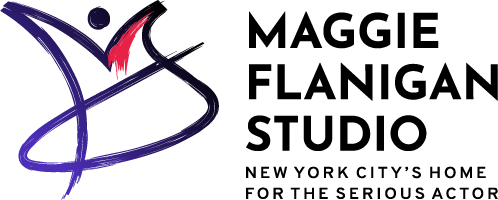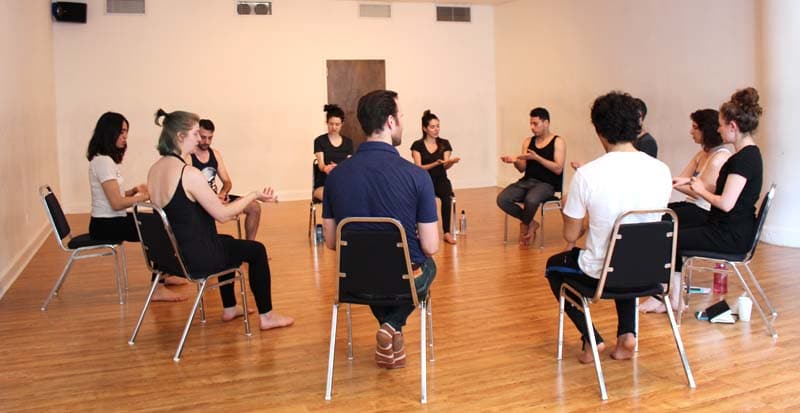APPLY FOR ADMISSION
FIRST YEAR MEISNER ACTING PROGRAM

BEGINS
SEPTEMBER 10TH

Call To Schedule an Interview
(917) 794-3878
Embodying a Character with Dialects
Raife Baker teaches Voice and Dialects for actors at the Maggie Flanigan Studio in New York City. In this blog post Raife discusses the relationship between dialects and the Meisner technique.
As a speech and dialect teacher, I work with students who are fully engaged in the Meisner Technique. One thing that makes a Meisner trained actor so distinct is in their ability to listen, and respond personally in every moment. My task is to help my students figure out exactly what they are trying to communicate with text, and how the WAY they speak can help them achieve their objectives. We do this by looking at the different ways in which arguments are structured. We look at rhetoric, culture, dialect, and musicality, and how these important clues help make the behavior they need to create as clear and vivid as possible. This specific type of text analysis is essential for an actor’s ability to create vivid, nuanced human behavior. The wonderful part of working with students steeped in Meisner training is their ability to bring depth and vulnerability to this important aspect of an actor’s skill.
The Meisner Technique trains actors to work simply and specifically, and this must be brought to language skills. By identifying some key structural parts of an argument, an actor can identify those words and phrases that are really going to give them the most “miles per gallon” in a scene (we would call them operative words). When an actor sits down to look at a scene or monologue, especially if that text is heightened or complicated, it can be a great and practical skill to be able to look through the text with an eye toward making clear arguments and specific choices about the most effective words to use in order to achieve with text.
Of course the REAL fun comes when an actor decides a distinct dialect is appropriate for a performance. Then we can start to look at the unique ways different cultures approach language. It is so rewarding to see students start to think about sounds in new and specific ways. I get excited when I see a student start to draw connections between patterns of pronunciation and inflection that they notice in the dialects they choose to tackle in class.
We all have a dialect, and therefore every character an actor plays ALSO has a dialect. It might not always be as specific as “Liverpool,” or “Latvia,” but making specific, consistent, playable decisions about language, vocal placement, and inflection can take an actor one crucial step closer to fully embodying a character. Familiarizing oneself with different vowel and consonant choices is just another way of empowering an actor. It is also a first step toward becoming versatile and adaptable: ready to tackle any new regional dialect that is required!
Learn More About Voice and Dialects for Actors
For more information about voice and dialect classes for actors at the Maggie Flanigan Studio, contact the studio directly by calling (917) 794-3878.
Recent Post
STUDENT TESTIMONIALS
“I was placed in the intense reigns of Charlie Sandlan. I became a better artist, actor, friend, sibling and daughter because of the studio. Even now, I crave the studio every day. What I learned is present in my work every day. I truly believe in everything they stand for.”

“Maggie taught me that I could control my work, my acting, and to throw all of the bullshit out that I had in my head about ‘what I should be doing’ and to just listen and respond honestly, in the moment. She gave me a craft. She is, quite simply put, THE BEST.”

“Maggie Flanigan taught me the true meaning of artistry, passion, and professionalism. I am certain that I continue to work as an actress because of my training with Maggie. At every audition and every performance, her guiding voice is with me. It is a gift beyond measure.”

“Maggie Flanigan is uncompromising, her instincts as a teacher are razor sharp. She doesn’t miss a beat”

“Maggie Flanigan has been one of the most important people in my artistic life. I want to work with Maggie trained actors. As an actor myself, she is my first source. I do not say this lightly, if you are serious about acting, and willing to work very hard, then go to Maggie.”

“Maggie helped me find my sense of truth, an actors greatest asset. Maggie is an expert at instilling that vital ingredient, which allows an actor’s potential to become limitless. My work will forever be rooted in the clarity and honesty she helped me develop.”

“After working for ten years, I did the 2 year program, and now feel that I have the tools I need to become the actor I’ve always dreamed of being. Maggie Flanigan instilled in me a clear sense of truth and a standard of perfection. I am a better actor because of this studio.”

“As an actor, the core of what you have to rely on is your sense of truth and humanity. Maggie allowed me to discover and embrace mine. Trusting my sense of humanity and truth has given me the ability to take risks in my work and my career decisions.”

“Maggie Flanigan has the unique ability to get an actor to the essence of what is true in a moment. She creates a safe and caring environment in which to work.”

“Maggie Flanigan introduced me to my own spirit and my own sense of Truth. Her passion for teaching and ability to communicate are rare gifts to any actor looking for a technique to set his or her talent free. Maggie’s voice has been the one constant guide in my career.”






